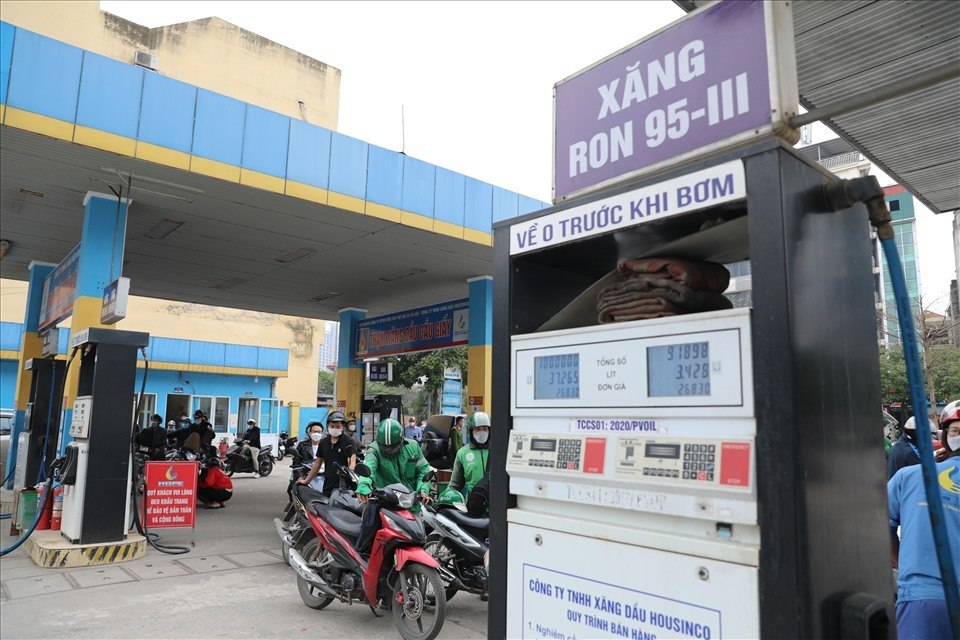Gasoline prices will gradually become completely marketized.
According to the Ministry of Industry and Trade, in order to move towards a complete marketization roadmap for domestic gasoline prices in the future, the 4th draft of the Decree on gasoline business is expected to only announce world gasoline product prices for two popular gasoline and diesel products on the market.
That is, gasoline RON 95-III, diesel 0.05S, instead of announcing the prices of 5 items as currently: RON 95-III, diesel 0.05S, E5 RON92, mazut, kerosene.
Based on the above forecast, according to the Ministry of Industry and Trade, RON 95-III gasoline and DO 0.05S-II diesel oil have a large consumption ratio, are popular gasoline and oil products on the market, affecting the majority of consumers, so the State needs to continue to announce world prices and input factors for businesses to calculate and announce according to the formula.
E5 RON 92 gasoline and other gasoline and oil products have a small consumption ratio, so businesses can proactively announce world gasoline and oil prices during price adjustment periods and decide on gasoline and oil prices on the market.
Currently, on the market, prices of products such as RON 95-V gasoline, RON 97 gasoline, and DO 0.001S-V diesel oil have been actively announced by key traders.
"Traders who announce gasoline prices must declare prices according to regulations. In case of unreasonable price increases, they will be inspected and handled by competent state agencies," the Ministry of Industry and Trade emphasized. This is a new content of the draft decree, a pilot step to explore the market to gradually apply gasoline prices completely according to the market mechanism.

Giving businesses the right to set prices does not mean that the State "let go" or "let go" of gasoline prices.
In a petition sent to the Minister of Industry and Trade to comment on the fourth draft of the Decree on petroleum trading, a group of petroleum distributors and retailers said that in the draft decree on petroleum trading, the Ministry of Industry and Trade proposed to give businesses the right to set their own petroleum prices.
Accordingly, the State only announces world petroleum product prices, source creation costs, standard business costs, and standard profits. Key petroleum traders calculate and announce petroleum selling prices.
The wholesale trader and the petroleum distributor shall announce the retail price of petroleum in the trader's petroleum distribution system on the market, not higher than the selling price of petroleum according to the prescribed formula. After announcement, the trader shall notify the selling price to the State agency for monitoring.
The community of petroleum distribution enterprises believes that the new regulations are not fundamental, as they still stipulate the cost of generating sources, standard business costs, standard profits, etc. at a specific level. That is, the State still sets the price, but the only difference from the old regulations is that enterprises perform the addition calculation instead of the State.
The community of gasoline distribution and retail businesses believes that it is necessary to fundamentally innovate the assignment of pricing authority, price agreement and price competition according to the provisions of the Law on Prices.
It is necessary to consistently ensure the real right for enterprises to self-determine prices, negotiate prices and compete on prices according to objective market signals; not that enterprises have the right to self-determine prices that do not exceed costs and profits (or maximum prices) prescribed by the State as in the draft decree.
"In our opinion, giving businesses the right to set prices does not mean that the State "let go" or "let loose" for businesses to set prices however they want, but the State must still control and regulate that right of businesses in appropriate forms.
For example, the State regulates and provides specific instructions on pricing principles, pricing bases, pricing methods (including methods for calculating costs and profits for all wholesale and retail price stages) so that businesses have standards for calculation according to market principles; clearly stipulates the authority to decide on prices and adjust prices," said a representative of the gasoline distribution and retail business community.
At the same time, implement a post-audit mechanism to review and check price calculation according to the above instructions, in order to prevent acts of abusing dominant market position and unreasonable pricing that harm the interests of the State and the people. In case of market fluctuations, enterprises must comply with and implement price stabilization measures prescribed by the State.











